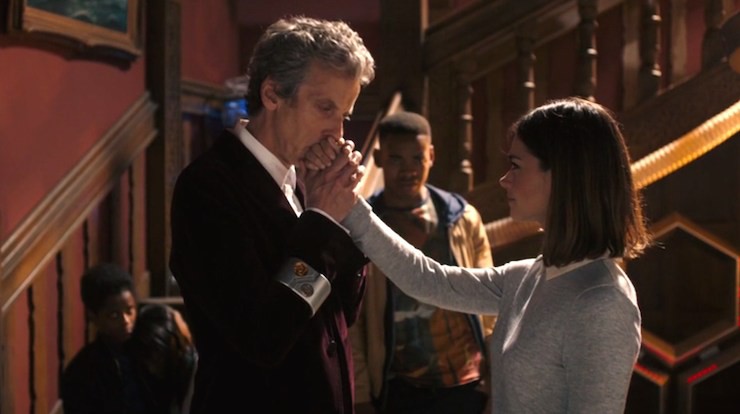You know when you’re going along enjoying some Doctor Who, and then the show takes out a sledgehammer and smacks you across the face?
Yeah, it’s one of those weeks.
Summary
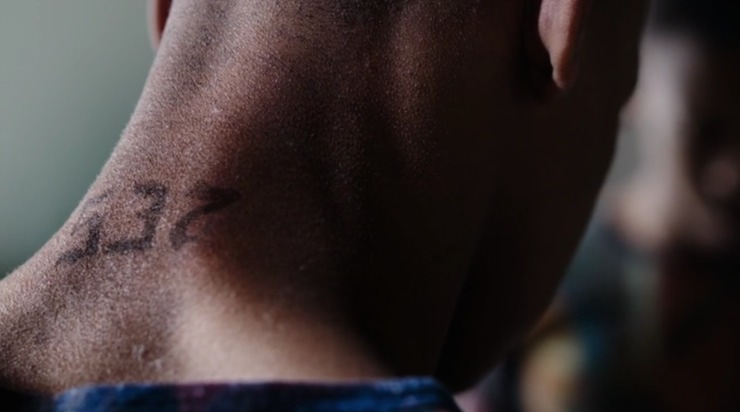
The Doctor and Clara have a grand old time getting kicked out of the most beautiful garden in the universe. When they get back on the TARDIS, the phone rings, and Rigsy (from last season’s “Flatline”) is on the phone. He has a tattoo on the back of his neck that is a number… which keeps counting down. They go to Rigsy’s place and discover that he has a partner and a baby girl, and that he missed work yesterday and doesn’t remember what he did, only that he came back with this tattoo. The Doctor explains that he had contact with aliens in that missing time (he’s been given Retcon to forget it), and that the tattoo is counting down to Rigsy’s death. Rigsy and Clara insist that the Doctor save him, so they work together to find out where Rigsy has been. They look for “trap streets” in London, places that the eye wanders over, and they end up stumbling onto an alien refugee camp run by Ashildr—now known as Mayor Me. She promises to keep Clara safe during their time on the street.
They’re told that Rigsy committed murder, killing a woman named Anah of the two-faced Janus species; the women of their culture can see into the past and future. This alien refugee camp has a precarious existence. The aliens are protected by light worms that cast a sheen over the camp, allowing people to see what they expect to see. Mayor Me keeps a very tight ship; Rigsy’s tattoo countdown in a chronolock that is linked to a shade (that typically appears in the form of a raven) who seeks out and kills whoever has the chronolock placed on them. The Doctor, Rigsy, and Clara witness one of these executions: an old man who stole from the camp’s medical rations to save his partner. Mayor Me refuses to lift the chronolock’s hold on him, doing so to keep the careful truce between so many different aliens intact. She admits that Rigsy was simply found standing over Anah’s body—there was no proof of his guilt. If the Doctor and Clara can convince the rest of the camp that Rigsy is innocent, she’ll release him. Clara finds out from one of the denizens that the chronolock can be passed to another person, if that person is willing to take it on. She has the idea to take it on herself, since Me promised to protect her, figuring that it will buy them more time in case it’s hard to convince people. Rigsy is reticent, but Clara insists.
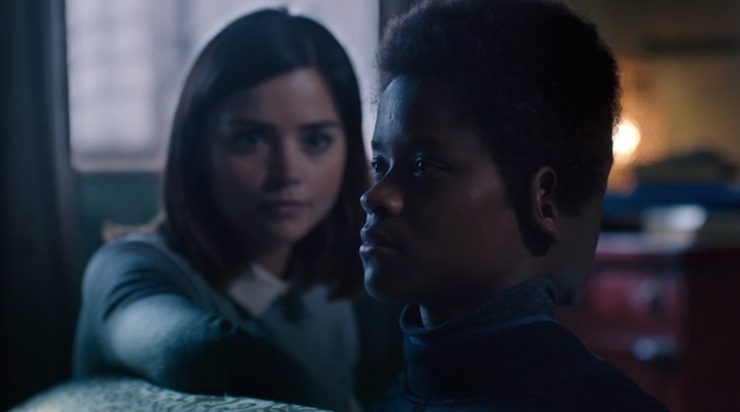
They go to speak to Anah’s son, Anahson—who turns out to be her daughter. She was hiding as a boy to stay safe, since only the females of their species have the ability to see through time. Anahson knows that Me created this whole frame up to bring the Doctor to the camp, but she can’t see how this will affect the Doctor because his timeline is so confusing. They go back to the chamber where Anah’s body is being kept, and the Doctor realizes that she’s still alive, just being kept in stasis. The only way to release her is through the control panel, which has a keyhole for the TARDIS key. The Doctor uses his key, releasing Anah, and getting a metal band wrapped around his arm for the trouble. Me admits that it’s a teleportation bracelet, a bargain she struck with another species to keep the aliens on her street safe. She asks the Doctor for his confession disc, which he hands over. She goes to take the chronolock off Rigsy, so Clara admits her scheme. Me is shocked; the contract she has with the shade only allows her to lift the chronolock on the person she issued it to… she cannot lift it from Clara.
The Doctor threatens Me, demanding that she save Clara, but Clara talks him down. She tells the Doctor that this was her choice, and her mistake, and begs him not to be angry at others for it. She tells him that she knows he’ll do badly following her death, and asks him to not to seek revenge or hurt anyone as a result. She asks him to be proud of her bravery, for facing her death the same way Danny Pink did. She goes out to the street to face the raven and dies. The Doctor tells Me that Clara asked him not to be angry for her sake, not his, and tells her that she would be wise to stay out of his way from now on. Me activates his teleportation band, and the Doctor disappears.
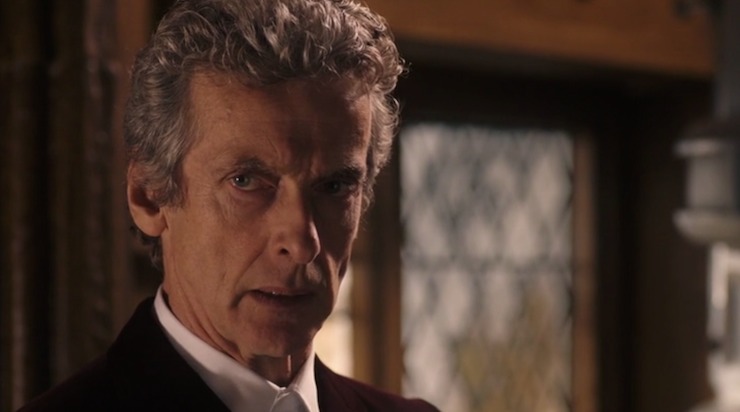
Commentary
So, um. I binge-watched Jessica Jones this weekend and decided that I’d use Doctor Who as a recovery from that…
…haha.
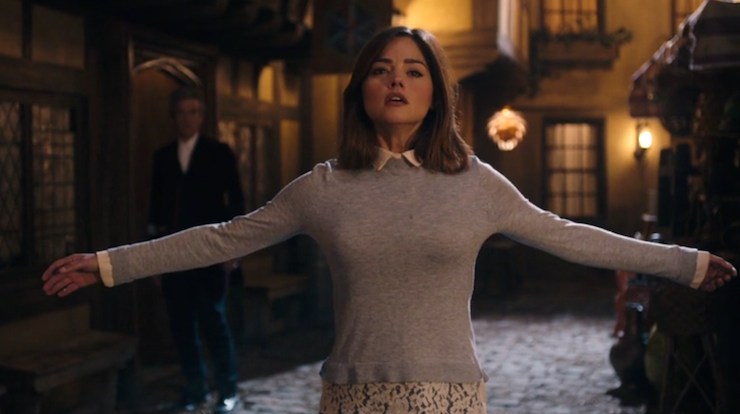
We knew that this was Clara’s last season (she’s set to appear in the final episode, but knowing Who, that could mean anything; as a hologram, as a past version of herself, as a figment that the Doctor’s brain conjures up in a moment of crisis). And Steven Moffat promised that Clara’s exit from the show was going to be final in a way that no New Who companion has been so far. If this is truly Clara’s death, then it would seem to be true—the Doctor has lost many people, but Clara’s exit makes her the first on-screen companion to die since Adric, a Fifth Doctor’s companion, way back in 1982.
This episode sees the return of Rigsy, and that poor man cannot catch a break. There are a number of topical aspects to this episode that look very different when examined without the sheen of aliens and time travel, and the idea of framing a black man for murder to appease a tense community cannot be ignored in this context. Ashildr nearly kills an innocent man, robs his infant daughter of a parent, for nothing but her own agenda. Her ploy required that she pick someone the Doctor already knew, of course, it’s just so upsetting that it had to be him. One can only hope that Rigsy will make it back to the Doctor one day and get to have an adventure that doesn’t put his life and happiness in such needless jeopardy. (He’d be a great companion to a female Doctor, methinks. Having an artist companion would be an awesome change-up from the usual.)
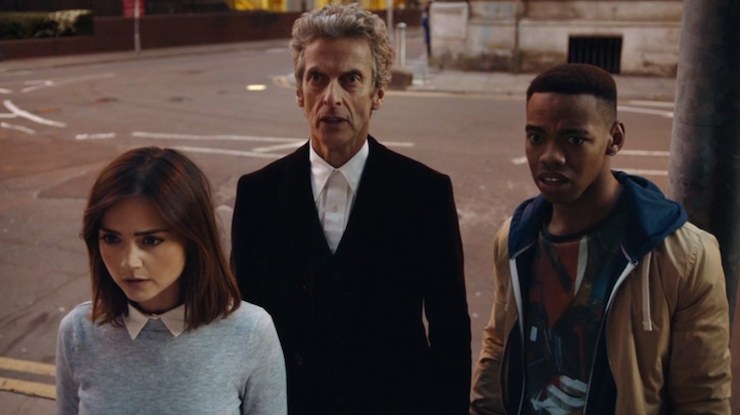
Can we talk about the Twelfth Doctor and his way of handling children? Because I know everyone loved Eleven and Stormageddon, but I think I prefer Capaldi with kids. His simultaneous wonder and daddy instincts make him seem so much safer than recent incarnations. Which is particularly funny since he’s supposed to come off a bit edgier than his predecessors… but try and convince me of that when he’s tying some random kid’s shoe, and getting all awed of Rigsy’s baby.
This episode is the second of the season to be penned by a woman—after a long deficit in that regard—and Sarah Dollard had some excellent credentials to recommend her to the show (including Merlin and Being Human). It’s a sharp script, layered and full of many new ideas that I hope become staples of the future. The use of trap streets made me assume that the Doctor was about to find Diagon Alley, and has endless possibilities for hidden aliens communities on Who. That said, the fact that Me is running a refugee camp is extremely topical right now, something that the show could not have predicted when the episode was in production. And to Doctor Who’s credit, these aliens are not demonized for their plight, distrusting as they are. We see how hard they must work to survive, how carefully their lives are policed.
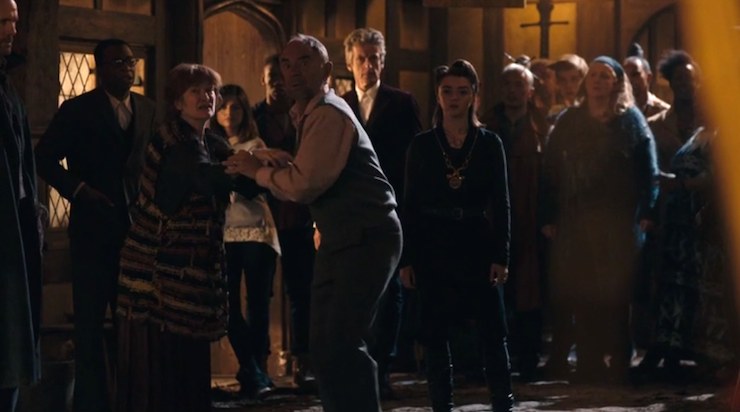
Mayor Me is trying to do something good with her influence and endless experience, but she is essentially wielding martial law over these beings, with no recourse for unacceptable behavior aside from death. It will be interesting to find out who she made this bargain with, protecting her little colony in exchange for the Doctor. If she doesn’t appear for the rest of the season, we can count on more from this community again.
And then there’s Clara. The instant it was made clear that the chronolock could be transferred, you knew she was going to take it on for herself. The question was only how bad the outcome could possibly be, which didn’t become obvious until Me’s usual resolve cracked.
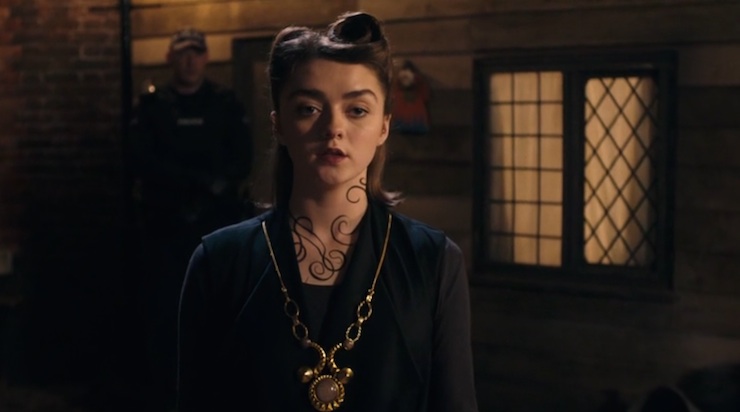
I expect that there’s a contingent of fandom that will be upset that Clara’s exit was not more dramatic, on par with Rose or Amy’s big bows. But this is a better call for Clara; her recklessness has been a theme this season, and yet she never apologizes for it, not even here at the end. Rather, she poses the question to the Doctor that every companion deserves to ask—if he is allowed to be reckless, then why can’t she? Clara was in it for the danger, for the mystery, for the ability to be hero. She got her wish. It doesn’t seem like a punishment for her choices, merely a logical outcome, one that she accepts because she’s always known it was coming. It is a logical outcome for the Doctor as well—the only difference for him is that he is, as he put it, slightly less breakable.
I’ve also noticed that there has been some commentary by viewers this season on being aggravated at Clara’s prolonged goodbye. This season has telegraphed her impending departure pretty heavily, giving us a fake-out death scenario in practically every story. And again, I’m not bothered by it. For my part, the surprise factor is never key to my enjoyment in a companion’s swan song. Every single costar on the show has announced their exit beforehand, and every single Doctor for that matter. It’s not the unknown that gets me—it’s the emotional impact of the goodbye. So far, every single companion has delivered in that regard. In fact, Clara’s reckless behavior this season made it all come together; allowing the audience to become accustomed to her cavalier attitude makes us complacent, unconcerned. By the time that it’s clear Clara isn’t going to get out of this particular scrape, the inevitability of it is painful in the extreme. We lost Clara Oswald a long time ago. It’s just taken a while for her number to come up.
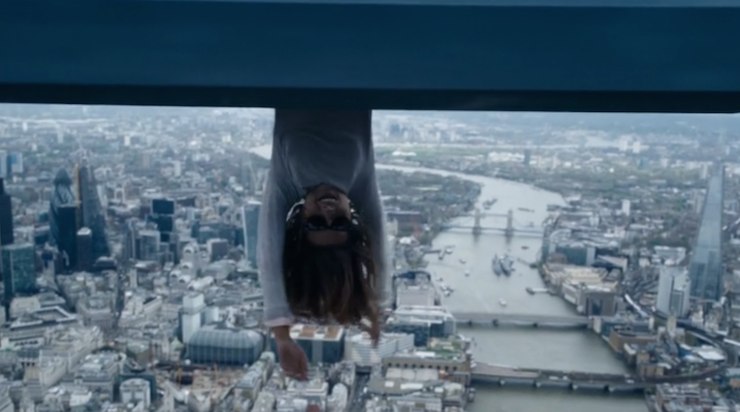
Perhaps most important of all, she died saving the life of one good friend. Because we’re so accustomed to companions doing extraordinary things in the Doctor’s name or their own, that we forget how important it is for them to do the subtle, smaller things that good people do. Her farewell is a perfectly constructed scene, allowing the two of them only enough time to say everything that matters without filters. Every second has to count.
And because Clara is a companion that has seen so much of the Doctor’s life, she’s one of the few who can ask him not to rail at her death and become the worst version of of himself. She echoes the words that she said to him back when he wore a different face: “Don’t be a warrior. Promise me. Be a Doctor.” And we know from the look on his face that it might be too much to ask of him, but you know those words will matter down the road. For all that Clara Oswald was on the TARDIS to fulfill her own desire for adventure and excitement (a noble cause indeed), when it’s over, she takes care of the people who matter to her. She has every right to ask the Doctor to be proud of her, and is every bit as brave as she asks herself to be.
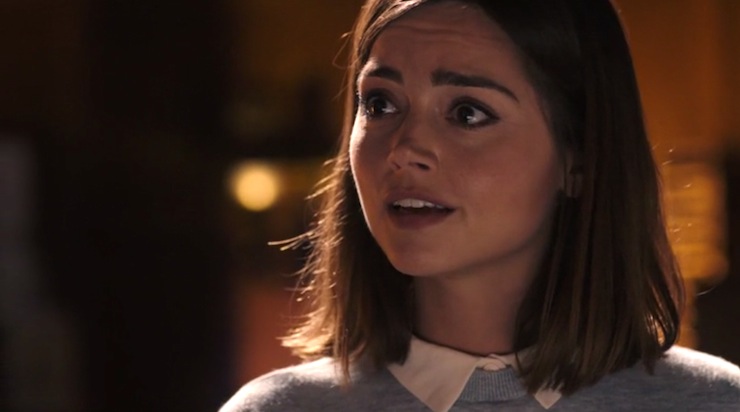
If I had a single nitpick, it’s with the editing; the shots of Clara’s final cry from multiple angles replayed is gratuitous, and does nothing to make the scene more impactful—if anything, it makes it seem more like a parody. But other than that, it was extremely well done by everyone involved.
Bits and bobs of note:
- Rigsy was given Retcon, the same amnesia drug popularized on Torchwood.
- Among the aliens we see in the camp are a Sontaran, two Judoon, and an Ood fixing up a Cyberman. (Can we get an episode about their friendship? I had so many questions.)
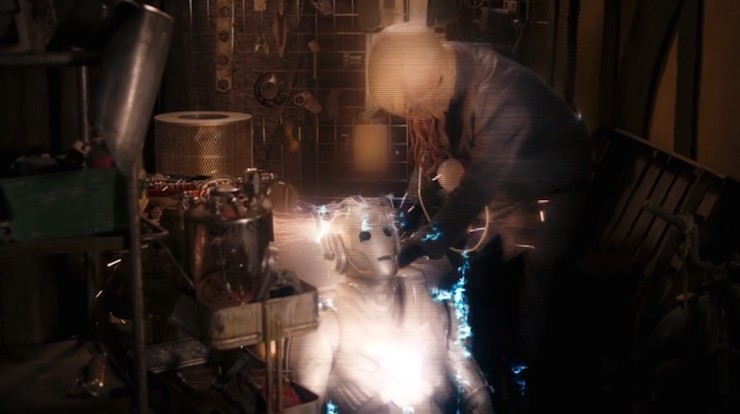
- Clara name-checks her kissing pal Jane Austen again.
- The Doctor pulls out his response cards that we saw in “Under the Lake” when he’s trying to break Rigsy’s impending death to him.
Emmet Asher-Perrin gave herself a tear-induced headache. You can bug her on Twitter and Tumblr, and read more of her work here and elsewhere.










